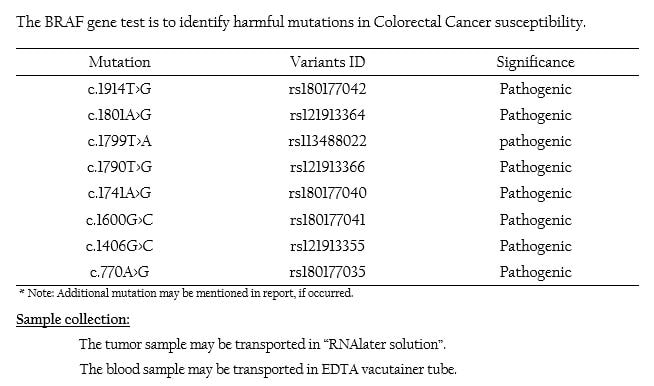BRAF Mutation Panel
BRAF overview:
- The BRAF is a proto-oncogene, which encodes for the BRAF protein kinase, is located on chromosome 7 (q34) and is composed of 18 exons.
- BRAF acts as a key player in the Epidermal Growth Factor Receptor (EGFR) mediated mitogen-activated protein kinase (MAPK) pathway, where it is activated by KRAS small GTPase[1].
- Also plays an important role in cellular processes, such as cell migration (through RHO small GTPases), apoptosis (through the regulation of BCL-2), and survival (through the HIPPO pathway)[2].
- BRAF mutation is considered as a driver in serrated pathway and serrated polyps are considered as its precursor lesions[3].
- BRAF is constitutively activated by mutation in 15% of all human known cancer types[4].
- BRAF mutation is more prevalent in proximal colon tumors; poorer differentiation, mucinous histology, MSI and larger primary tumors have been proposed as unique pathological features[5].
- Somatic mutations in BRAF, observed in 10% to 20% of colorectal cancers and associated with poorer survival, may also impact response to certain treatment regimens[6&7].
- About, 80% mutations in the BRAF gene have been reported with varied frequencies. For instance, 67% of melanomas exhibit BRAF mutations, whereas 30% in other tumours, such as thyroid cancer (15%), and lung cancer (3%)[5&8].
- These patients have a poor prognosis after the failure of first-line therapy
- BRAF mutations are detected in 10% to 15% of colorectal cancer patients and they are associated with shorter-progression rate and overall survival[9-10].
- Proximal right-sided colorectal cancer tumours is associated with poor prognosis and are highly enriched in BRAF mutations[11-12].
- Metastatic spread seems to differ from BRAF wildtype (BRAF-WT) tumors with more peritoneal metastasis and less liver- and lung metastasis[13].
- BRAF mutations are found in 7-10% of the patients with metastatic colorectal cancer[14].
- The BRAF mutation is a bad predictor against anti-BRAF therapies suggests that the biology underlying this mutation is signaling through the MAPK pathway in a complex manner.
- Therapies targeting MAPK have been introduced in the treatment of metastatic colorectal cancer. However, there are mutations that confer resistance to these therapies such as KRAS[15-16].
- BRAF mutation may confer metastatic colorectal cancer a worse prognosis and resistance to therapies at both earlier and advanced disease stages.
- Lavoie H, and Therrien M. (2015). Nat Rev Mol Cell Biol, 16(5):281–298.
- Matallanas D, et al., (2011). Genes Cancer, 2(3):232–260.
- Rad R, et al., (2013). Cancer Cell, 24: 15–29.
- Davies H, et al., (2002). Nature, 417(6892):949–954
- Clancy C, et al., (2013). Colorectal Dis, 15: e711–e718.20–22
- Yamauchi M, et al., (2012). Gut, 61:847–54.
- Loupakis F, et al., (2009). Br J Cancer;101:715–21.
- Puxeddu E, and Filetti S. (2013). Endocrine, 45; 341–343.
- Tejpar S, et al., (2010). Oncologist, 15(4):390–404.
- Yuan ZX, et al., (2013). PLoS One, 8(6):e65995
- Meguid RA, et al., (2008). Ann Surg Oncol, 15(9):2388–2394.
- Missiaglia E, et al., (2014). Ann Oncol, 25(10):1995–2001.
- Yaeger R, et al., (2014). Cancer, 120: 2316–2324.
- Tie J, et al., (2011). International Journal of Cancer, 128(9):2075-2084.
- Karapetis CS, et al., (2008). N Engl J Med, 359: 1757–1765.
- Amado RG, et al., (2008). J Clin Oncol, 26: 1626–1634.

